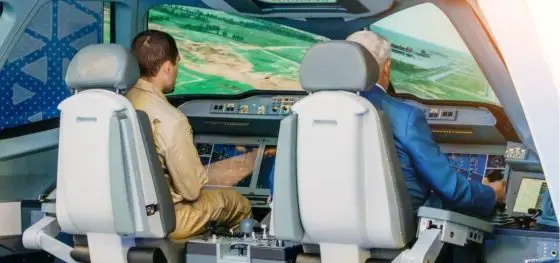Flight simulator for pilots is an essential tool that enhances training, refines skills, and elevates the overall flying experience. With its advanced technology and immersive features, this simulator provides a realistic environment for pilots to practice various scenarios and hone their abilities. Whether it’s mastering complex maneuvers, navigating challenging weather conditions, or simulating emergency situations, the flight simulator for pilots offers a safe and controlled space to improve proficiency.
In this article, we will delve deeper into the benefits and significance of incorporating a flight simulator into pilot training. So, fasten your seatbelts and get ready to explore the world of virtual flying!
Table of Contents
Enhance Pilot Training With Advanced Flight Simulator
Flight simulators have revolutionized pilot training, providing an immersive and realistic experience for aspiring aviators. These advanced training tools allow pilots to practice various scenarios, procedures, and maneuvers in a safe and controlled environment.
In this article, we will explore the benefits and features of flight simulators for pilots, how they enhance training, and why they have become an integral part of pilot education.
The Evolution of Flight Simulators
Flight simulators have come a long way since their inception. Early simulator models were limited in their capabilities, often resembling little more than basic video games. However, advancements in technology and computing power have transformed these simulators into highly sophisticated training systems.
Modern flight simulators replicate the look, feel, and functionality of actual aircraft, providing pilots with a realistic experience. From realistic cockpit controls to accurate flight dynamics, these simulators aim to create an environment that closely mimics real-world flying conditions.
Realism and Immersion
One of the key advantages of flight simulators is their ability to create a realistic and immersive training experience. Simulators are equipped with high-fidelity graphics, detailed terrain, and authentic aircraft models, enabling pilots to feel as if they are truly flying.
The level of realism extends beyond the visual aspects of the simulator. Flight simulators incorporate realistic sounds, vibrations, and even motion systems that simulate the sensations of flying. These elements enhance the overall experience and help pilots develop a deeper understanding of the aircraft’s behavior and response in different situations.
Read More: About How To Plant Bare Root Peonies?
Cost-Effective Training
Flight training can be an expensive endeavor, especially for aspiring pilots. Owning or renting an actual aircraft for training purposes can be prohibitively expensive. This is where flight simulators shine, providing a cost-effective alternative for pilot training.
Simulators eliminate the need for fuel, maintenance, and airspace fees associated with real-world flying. Pilots can practice in a simulator for a fraction of the cost of flying a real aircraft, making it an attractive option for both students and experienced pilots looking to refine their skills.
Safety and Risk Management
Safety is paramount in aviation, and flight simulators play a crucial role in ensuring pilots are well-prepared to handle emergency situations. Simulators allow pilots to practice emergency procedures, such as engine failures, system malfunctions, and emergency landings, without putting themselves or others at risk.
By simulating challenging scenarios, pilots can develop critical thinking skills, muscle memory, and decision-making abilities in a controlled environment. This helps build confidence and enhances their ability to respond effectively in real-world situations.
The Benefits of Flight Simulators for Pilot Training
Flight simulators offer a range of benefits that contribute to the effectiveness of pilot training.
Let’s explore some of the key advantages:
Repetitive Training
Repetition is crucial for skill development, and flight simulators excel in providing repetitive training opportunities. Pilots can repeat specific maneuvers, procedures, or scenarios as many times as needed, allowing them to refine their techniques and build muscle memory. This level of repetition is often not feasible in real-world flying, making simulators an invaluable tool for skill enhancement.
Scenario-Based Training
Flight simulators enable pilots to practice a wide range of scenarios, including adverse weather conditions, challenging approaches, and emergency procedures. By exposing pilots to these scenarios in a safe and controlled environment, simulators help them develop the skills and confidence needed to handle real-world challenges. Additionally, instructors can tailor scenarios to specific training objectives, ensuring pilots receive targeted training that focuses on their individual needs.
Instrument Flight Training
Instrument flight training (IFR) is a critical aspect of pilot education. Simulators provide an ideal platform for IFR training, allowing pilots to practice instrument approaches, navigation procedures, and communication protocols with air traffic control. The ability to simulate various weather conditions and airport environments enhances the realism of IFR training, preparing pilots for the complexities of instrument flying.
Crew Resource Management
Aviation is a team effort, and effective communication and coordination among flight crew members are essential for safe operations. Flight simulators enable pilots to practice crew resource management (CRM) skills, such as communication, decision-making, and workload management, in a realistic environment. Pilots can simulate multi-crew operations and develop the necessary skills to work seamlessly as a team.
Systems Familiarization
Modern aircraft are equipped with complex systems and avionics. Flight simulators allow pilots to familiarize themselves with these systems, including navigation aids, autopilot functions, and cockpit displays. By practicing system operations in a simulator, pilots can become proficient in using these technologies, enhancing safety and efficiency in real-world flying.
The Future of Flight Simulators
Flight simulators continue to evolve, driven by advancements in technology and the demand for more sophisticated training tools. Here are some exciting developments and trends in the world of flight simulators:
Virtual Reality (VR)
Virtual reality technology is gaining traction in the aviation industry, offering even more immersive training experiences. VR headsets provide a 360-degree visual display, allowing pilots to look around the cockpit and interact with their surroundings in a more natural and intuitive way. This technology has the potential to further enhance the realism and effectiveness of flight simulators.
Artificial Intelligence (AI)
Artificial intelligence is being integrated into flight simulators to create more intelligent and realistic virtual environments. AI algorithms can generate dynamic weather patterns, air traffic behavior, and even simulate realistic aircraft system failures. This enables pilots to train in highly realistic and challenging conditions, further sharpening their skills.
Connectivity and Networking
Flight simulators are increasingly being designed to incorporate connectivity and networking capabilities. This allows pilots to participate in shared training scenarios, where multiple simulators can interact with each other in the same virtual airspace. This collaborative training approach promotes teamwork and coordination among pilots in a simulated environment.
Enhanced Instructor Tools
Flight simulator software now includes advanced instructor tools that enable instructors to monitor and debrief pilot performance more effectively. Instructors can observe pilots’ actions in real-time, provide feedback, and analyze flight data to identify areas for improvement. These tools facilitate better communication and accelerate the learning process.
Flight simulators have transformed pilot training by providing a safe, realistic, and cost-effective learning environment. The benefits of flight simulators, such as enhanced realism, repetitive training opportunities, and scenario-based learning, make them invaluable tools for aspiring and experienced pilots alike.
As technology continues to advance, flight simulators will play an increasingly significant role in shaping the future of aviation training.
Whether it’s honing skills, practicing emergency procedures, or mastering instrument flying, flight simulators are undoubtedly taking pilot training to new heights.
What It Takes To Become A Pilot — inside United’s Simulator
Frequently Asked Questions (FAQs)
A flight simulator for pilots is a highly realistic computerized system that replicates the experience of flying an aircraft. It provides a simulated environment for pilots to practice and enhance their flying skills without being in an actual aircraft.
Flight simulators offer numerous benefits to pilots. They allow pilots to practice various maneuvers, emergency procedures, and instrument flying in a safe and controlled environment. Simulators also help pilots improve their decision-making skills, situational awareness, and overall proficiency.
Flight simulators cannot fully replace actual flight training, but they are an essential complement to it. Simulators provide pilots with additional training opportunities and help them build confidence and familiarity with different aircraft and scenarios. However, real-world flight experience remains crucial for mastering the practical aspects of flying.
Yes, flight simulators are designed to replicate specific aircraft types. There are simulators available for various commercial, military, and general aviation aircraft models. Pilots can choose the simulator that matches the aircraft they fly or intend to fly to gain the most relevant training experience.
Absolutely! Flight simulators are particularly useful for instrument training. They accurately simulate instrument panels, avionics, and the challenging conditions encountered during instrument flight. Pilots can practice instrument approaches, navigation, and instrument flight rules (IFR) procedures in a realistic virtual environment.
Yes, flight simulators have the capability to simulate various weather conditions. Pilots can experience flying in different wind patterns, cloud formations, rain, snow, turbulence, and even thunderstorms. Simulating different weather scenarios enhances pilot training by exposing them to challenging conditions they may encounter in real flights.
Flight simulators cater to pilots at all experience levels. Novice pilots can use simulators to learn basic flight procedures and aircraft handling, while experienced pilots can utilize simulators to refine their skills, practice advanced maneuvers, and stay current. Simulators are effectively used by pilots at every stage of their career.
Absolutely! Flight simulators are valuable tools for team training and emergency simulations. Crew members can practice working together in various scenarios, including handling system failures, emergency landings, and abnormal procedures. Simulators foster effective communication and coordination among team members, improving overall flight safety.
Read More: About hotel fire alarm went off
Final Thoughts
Flight simulators for pilots offer an invaluable training tool that replicates real-life flying scenarios with remarkable accuracy. These simulators provide pilots with a safe and controlled environment to practice various flight maneuvers, emergency procedures, and instrument approaches. The advanced technology and realistic graphics allow pilots to enhance their skills, improve decision-making abilities, and gain confidence before taking to the skies.
With a flight simulator for pilots, aspiring aviators and seasoned professionals alike can hone their skills, refine their techniques, and continuously improve their overall flying proficiency. The importance of flight simulators in pilot training cannot be overstated, making them an essential component of any pilot’s journey.






